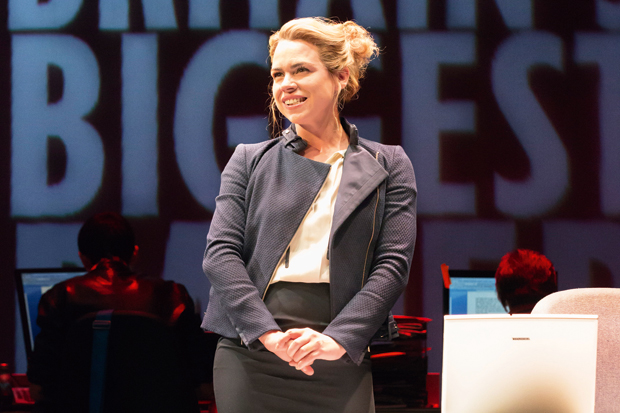Mr Bean, one of our greatest comic exports, has an alter ego. The second Mr Bean, forename Richard, is the author of One Man, Two Guvnors, which thrilled audiences on both sides of the Atlantic. His latest play, Great Britain, dissects the corruption of power in parliament and beyond. The inevitable comparisons with The Duck House, which mocked the expenses scandal, are a little unfair, since the temperament and the intention of the two shows are vastly different.
The Duck House was a delicious slice of theatrical levity about a Home Counties couple drawn into criminality by the culture of parliament. And being a family comedy, it had reserves of emotional warmth that Mr Bean’s scabrous blast of satire entirely lacks. His play adopts the glib sixth-form view that every journalist, politician and policeman in Britain is a ruthless back-stabbing self-promoter. There are no human beings here, only weasels, snakes, rats and vultures.
The central character, Paige Britain, is a gorgeous, stony-hearted red-top news psycho determined to grab whatever she can of money and power while knifing her enemies to death and battening on their corpses. Her newsroom is a vipers’ nest of gloating, swearing hacks who share her greed and ruthlessness. Several audience members swept imperiously from the Lyttelton within a few minutes of curtain-up. Others pulled the ripcord at the interval.
The play is in a hurry to cover a decade of vice and crime and it very nearly trips up on its over-enthusiasm. Terrorists bomb the Tube. Two schoolgirls are abducted and killed. The chief suspect is murdered while on remand. London cops shoot dead innocent black bystanders. A talentless, fornicating Tory MP persuades a media baron to back his leadership bid. A hapless journalist disguises himself as an Arab sheikh and is recognised instantly. On it goes. The pace is relentless.
But there are some exquisite comic distortions. The Murdoch figure is an Irish billionaire who invites his yacht guests out on to the deck after lunch and encourages them to shoot sharks with assault rifles. There’s a gay Asian police chief — the only likeable character — whose press conferences are strewn with gaffes. ‘A clue is the one thing I have not got,’ he says of a bungled investigation. Cyber geeks re-edit his speeches and post them on YouTube with silly music, like Nick Clegg’s ‘I’m sorry’ clip. All the video work is brilliantly executed. Screens broadcast spoof tabloid headlines about immigrants eating swans and — even worse — failing to recognise the name ‘Bobby Moore’. But as the play goes on, its anger and lack of cordiality create an upsurge of moral nausea which sets the audience at a distance. Everything is for sale. Friendship doesn’t exist. Nor does love. Sex is a weapon to be deployed when blackmail and bribery have failed.
The character of Paige Britain (nicely done by Billie Piper) breaks the fourth wall and harangues us for our moral complicity in the corruption of newspapers. OK, it’s a fair cop. We all hum a little tune of triumph when we see the mighty dragged from their pedestals and torn to bits. But to scold us for our imperfections from the stage of the National is an ungracious blunder. And it’s pretty artless too. A shrewder dramatist would have given that preachy sentiment to a character and caused him or her to live it, to suffer it and to learn from it. This play will be popular with the angry, the powerless, the embittered and the cynical, and they may overlook the moral blindness of Mr Bean. He excoriates us for gloating over the downfall of the mighty while doing exactly the same himself.
Which leaves scant room for a gem of a play by Robin Soans. Perseverance Drive is set among devout Christians in Barbados. The Gillard family have gathered for their mother’s funeral, and tensions immediately arise between the mainstream worshippers and the splitters, who have formed a breakaway church. All unite temporarily in their condemnation of a gay relative, Josh, whom they treat as they might a leper in a suicide vest. The play makes an easy contrast between the generous gay atheist and his cruel Christian brethren, who are rich in piety but bereft of humanity. It also makes the subtler point that psalm-singing churchgoers are essentially allergic to modern life. And such people tend to be allergic to each other as well. The fractures within this community are emotionally identical to those that split all extremist movements, from Marxists to the Sunni insurgents. Clint Dyer is wonderfully light and humorous as Josh. And Akiya Henry, as Joylene, moves with great skill from nervy outsider to all-powerful matriarch.
But why did Soans set his play 3,000 miles from the Bush theatre? If he tacks towards the middle ground, he’ll have a popular hit on his hands.
Got something to add? Join the discussion and comment below.
Get 10 issues for just $10
Subscribe to The Spectator Australia today for the next 10 magazine issues, plus full online access, for just $10.
You might disagree with half of it, but you’ll enjoy reading all of it. Try your first month for free, then just $2 a week for the remainder of your first year.














Comments
Don't miss out
Join the conversation with other Spectator Australia readers. Subscribe to leave a comment.
SUBSCRIBEAlready a subscriber? Log in